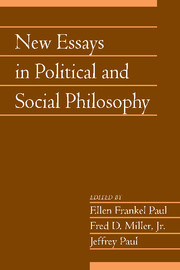Book contents
- Frontmatter
- Contents
- Introduction
- Acknowledgments
- Contributors
- Political Liberty: Who Needs It?
- State Coercion and Force
- Political Legitimacy and Economic Liberty
- Who Owns What? Some Reflections on the Foundation of Political Philosophy
- Human Reproductive Interests: Puzzles at the Periphery of the Property Paradigm
- Why Free Trade is Required by Justice
- Structural Exploitation
- Rescuing Justice from Equality
- Reinterpreting Rawls's The Law of Peoples
- Responsible Choices, Desert-Based Legal Institutions, and the Challenges of Contemporary Neuroscience
- Genocide and Crimes Against Humanity: Dispelling Some of the Conceptual Fog
- Harm and the Volenti Principle
- Education and the Modern State
- Index
State Coercion and Force
- Frontmatter
- Contents
- Introduction
- Acknowledgments
- Contributors
- Political Liberty: Who Needs It?
- State Coercion and Force
- Political Legitimacy and Economic Liberty
- Who Owns What? Some Reflections on the Foundation of Political Philosophy
- Human Reproductive Interests: Puzzles at the Periphery of the Property Paradigm
- Why Free Trade is Required by Justice
- Structural Exploitation
- Rescuing Justice from Equality
- Reinterpreting Rawls's The Law of Peoples
- Responsible Choices, Desert-Based Legal Institutions, and the Challenges of Contemporary Neuroscience
- Genocide and Crimes Against Humanity: Dispelling Some of the Conceptual Fog
- Harm and the Volenti Principle
- Education and the Modern State
- Index
Summary
“Covenants, without the Sword, are but Words, and of no strength to secure a man at all,” Thomas Hobbes famously proclaimed. He exaggerated. As I shall point out later, his position is more subtle than that suggested by this famous citation. There is no doubt, however, that he thought the sword to be of central importance to the state. This is one of the very few points about which there is little disagreement today with Hobbes; state power is widely thought to be coercive. The view that governments must wield force or that their power is necessarily coercive is widespread in contemporary political thought. For instance, John Rawls claims that “political power is always coercive power backed up by the government's use of sanctions, for government alone has the authority to use force in upholding its laws.” He is not alone in thinking this, as we shall see. This belief in the centrality of coercion and force plays an important but not well-appreciated role in contemporary political thought. However, it is an idea which is to some extent mistaken and quite misleading.
State Power is Coercive
Rawls's belief in the coercive nature of political power appears to be significant for his liberal theory. It is one of two special features of “constitutional regimes” central to his influential conception of political legitimacy. The other feature is that “[p]olitical society is closed: we come to be within it and we do not, and indeed cannot, enter or leave it voluntarily.” Indeed, it is these two features that he believes give rise to “the question of the legitimacy of the general structure of authority.” Rawls thinks that
our exercise of political power is fully proper only when it is exercised in accordance with a constitution the essentials of which all citizens as free and equal may reasonably be expected to endorse in the light of principles and ideals acceptable to their common human reason. This is the liberal principle of legitimacy.
- Type
- Chapter
- Information
- New Essays in Political and Social Philosophy , pp. 28 - 49Publisher: Cambridge University PressPrint publication year: 2013

